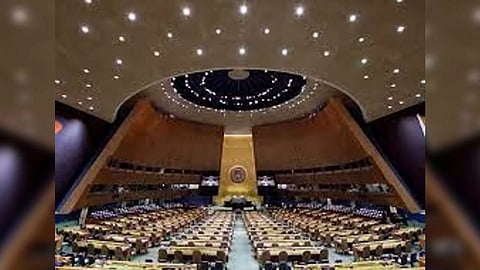

Last Friday, India abstained from a vote in the UN General Assembly that called for a humanitarian truce to allow unhindered aid to people in Gaza who are being subjected to relentless bombardment by Israel ever since the Hamas attacks on Oct 7. The Jordan-backed resolution received overwhelming support from 120 countries with only 14, including Israel and the USA, voting against. By deciding to abstain, India chose to be among 45 countries—most of them from the American sphere of influence who, by classic prevarication, abet Israel in its dispossession of Palestinians.
India’s deputy representative to the UN Yojna Patel explained that the abstention was due to the resolution’s omission of any mention of the terror acts committed by Hamas on Oct 7. In fact, prior to this vote, India had backed a failed Canadian amendment that wanted to introduce a clause specifically condemning Hamas and the taking of hostages. This line of argument, of making condemnation of terror acts a precondition to any humanitarian response to the plight of Gaza, is a trademark Israeli tactic to frame the narrative in a security perspective rather than within the long and continuing saga of driving Palestinians away from their own land. It is significant that India, a victim of colonialism, should now position itself in alignment with this line.
Patel’s explanation made no attempt to couch the fact that India’s policy on the Palestinian question is now very Israel-adjacent. The remarks could have been taken straight from the Western playbook on the Palestine question: “The terror attacks in Israel on October 7 were shocking and deserve condemnation. Our thoughts are with those taken hostage. We call for their immediate and unconditional release.”
The decision to abstain makes it clear that Prime Minister Modi’s immediate reaction to the Hamas attacks, expressing solidarity with Israel, was no knee-jerk reaction. Although the Ministry of External Affairs did try to parse the PM’s tweets by saying that there is no change in India’s support to the Palestinian cause, it is now clear that New Delhi has decided to depart from its old policy of anti-colonialism and become an active participant in the emerging US-led Indo-Pacific geostrategic alliance in which Israel will be a major player. While the old homilies about anti-colonial struggles will continue to be canted, India will put its money where its mouth is and revel in being the jewel in the grand global alliance that is being forged.
Advocates of a foreign policy based on economic self-interest will argue that India cannot continue to ride the woke bandwagon for Palestine while depending on Israel’s supply of arms. However, they fail to consider that the pro-Palestine policy too was based on self-interest: not only are there 200 million Muslims in India, at least a third of India’s foreign remittances of $90 billion come from West Asian countries, where public opinion is currently inflamed over the cruelty being rained upon Gaza.
Israel is not the only friend India seeks in the Middle East. We have business with Saudi Arabia, UAE, and Qatar too. The Gaza conflict has caught some of them in mid-process as they move towards normalisation of ties with Tel Aviv. None of those monarchies, even if they rule by diktat, will risk the wrath of their people and continue along that path. The Hamas attacks have put paid to any Arab-Israeli deal-making in the near future. If Gaza becomes a humanitarian catastrophe and Arab states have to take a stance willy nilly, India may just end up with Israel as one friend and several estranged Arab ones.